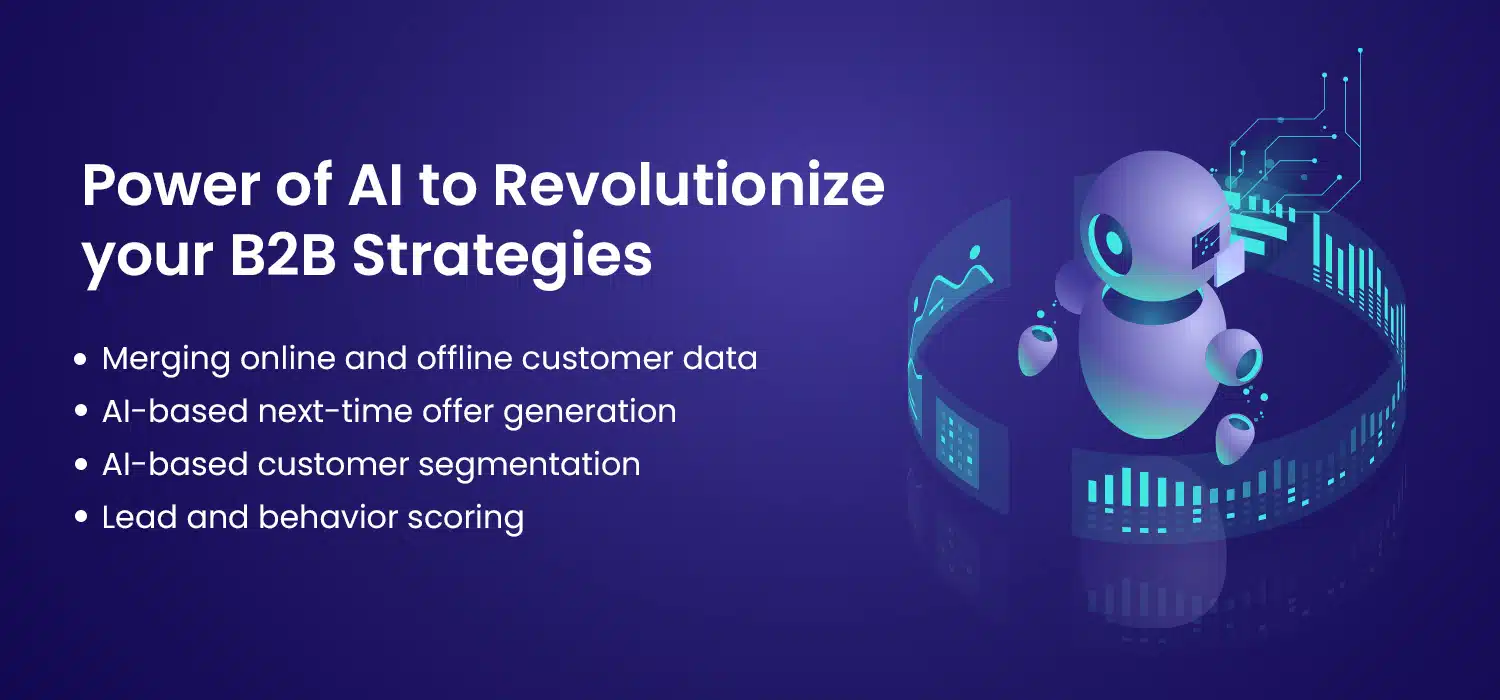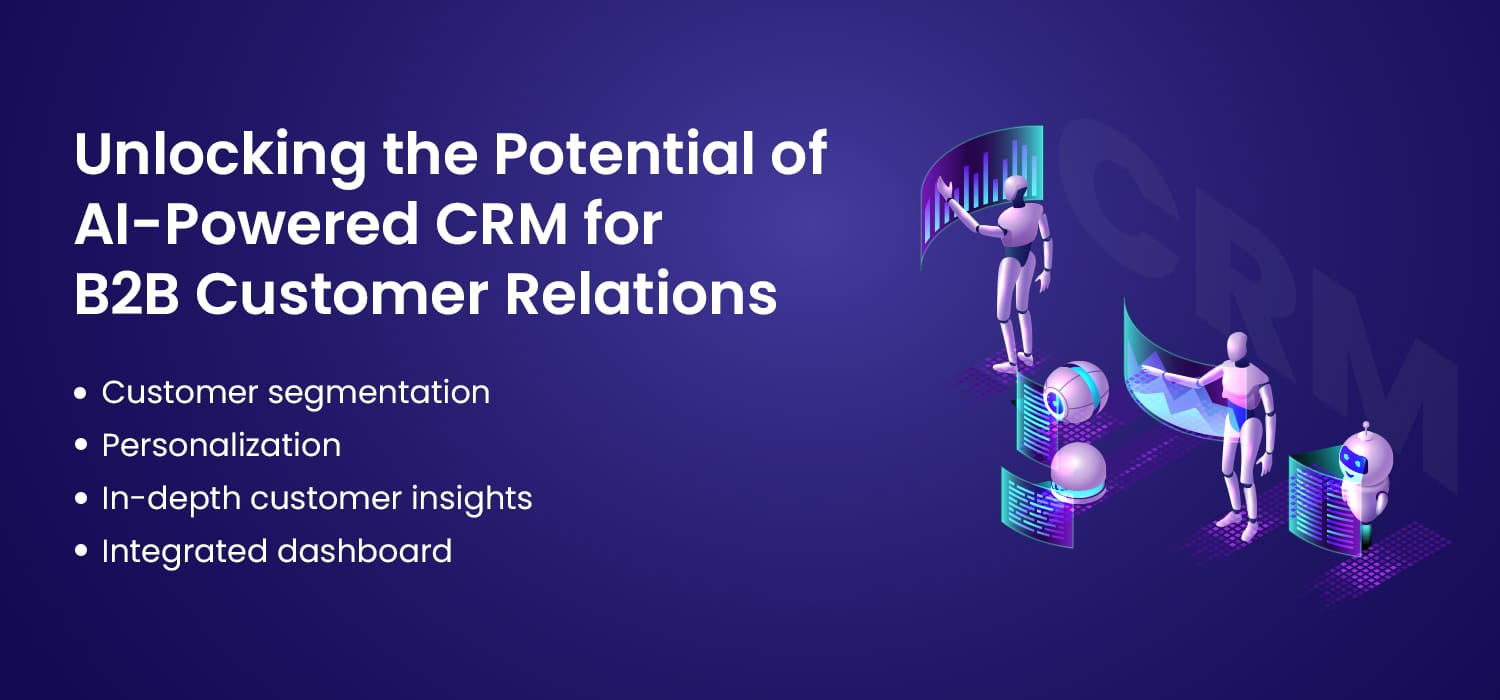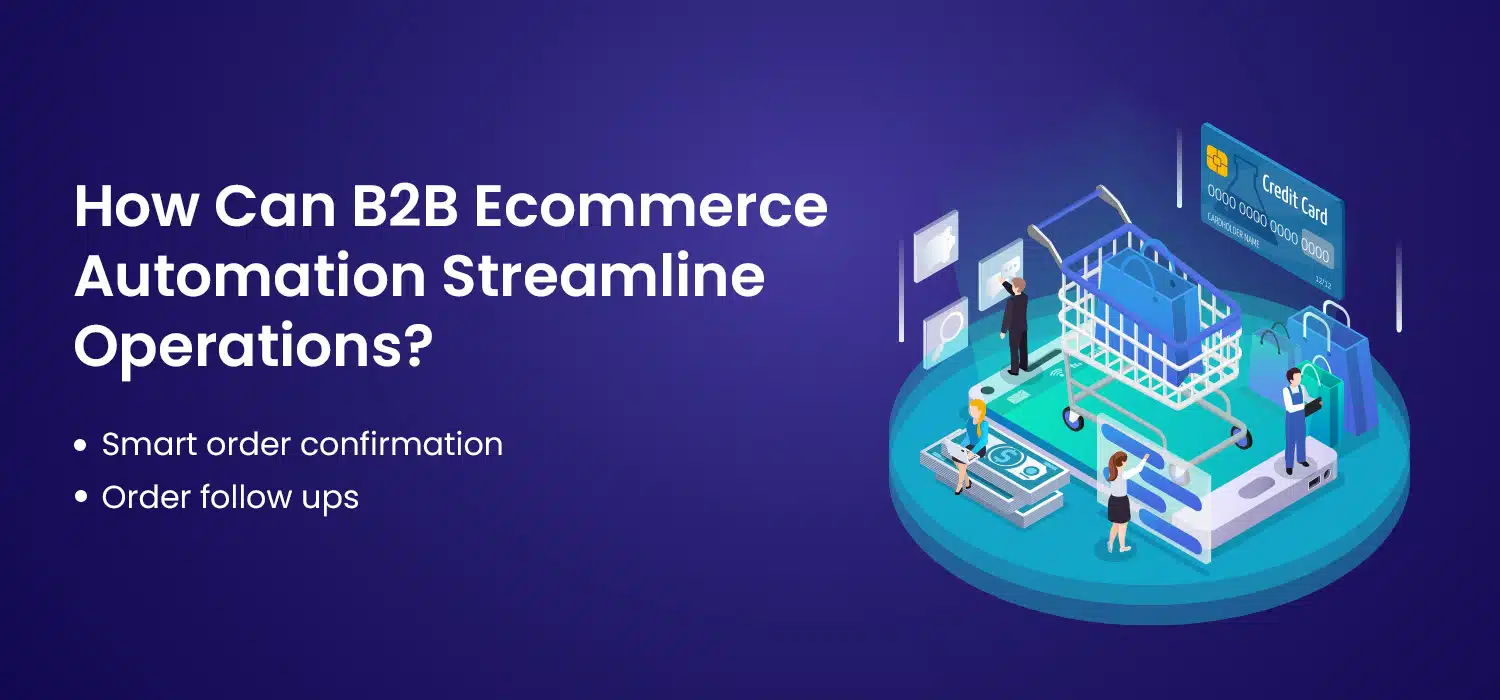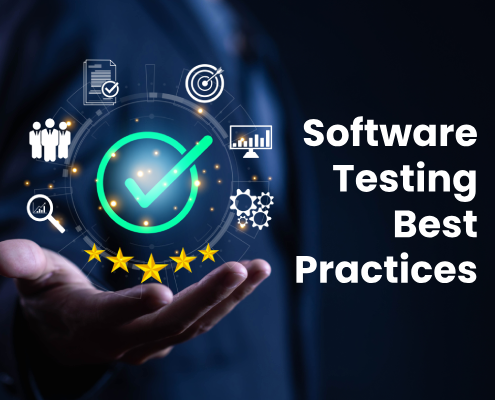AI in B2B eCommerce is gaining momentum, following the success seen in the B2C ecosystem. From using big data to analyze market trends to leveraging predictive AI for accurate forecasting, artificial intelligence is transforming how businesses operate. While B2C has long embraced these technologies, B2B eCommerce is now adopting AI to enhance personalization, streamline operations, and improve customer experiences. A recent study revealed that global spending on artificial intelligence in the eCommerce industry is expected to hit $8 billion by 2024, highlighting the growing impact of AI in B2B eCommerce.
But now, the perspective has shifted from B2C to B2B, with businesses from the latter ecosystem expressing their desires to integrate AI in their day-to-day operations, architecture, and workflows. While the technology is yet to penetrate the B2B market in depth, we cannot turn a blind eye to the host of innovative and state-of-the-art opportunities it offers. That being said, we have illustrated the benefits and challenges of integrating AI in B2B ecommerce architecture and processes, strategies, and other relevant facts in detail. With this guide, not only can you make the right call for your commerce business’s success but also receive a boost for the much-needed digital transformation.
Understanding AI In B2B Ecommerce
The B2B commerce ecosystem operates in a much different way than B2C even when both terms synchronously refer to online sales. While the former refers to selling products to another business, the latter has individual end-users as the customer. For instance, a B2B shoe manufacturer will sell its products in bulk to a retailer shop or footwear boutique, which itself is a business entity. On the contrary, a B2C shoe manufacturer will sell its products directly to the end users without any middle entity.
Since B2B has more complexity, integrating AI on the same principles as of B2C won’t bring any good. For instance, if you think that generative AI can help you produce content as spectacularly as it does for B2C commerce and help in customer retention, your expectations won’t be met. This is because B2C customers take actions based on their emotions and hence, the longevity of their loyalty towards the business isn’t long. However, when you consider a B2B structure, the customers are high-end businesses with complex and more customized expectations from the online seller. As a result, they prefer more logical decisions and wish to stay loyal to a business for years.
Therefore, meeting such expectations with AI in B2B ecommerce will require more complex and well-though strategies, in-depth understanding of the challenges in the B2B ecosystem, and plans for large-scale user training and technology adoption. One thing that you should remember from the very beginning is that implementing B2C AI strategies might not drive ROIs or help you evaluate your B2B customers’ desires. So, designing tailored solutions to meet the industry specifics is imperative.
AI Tools That Can Be Used for B2B Ecommerce
Whether you want to drive digital transformation or fine tune business interactions with the customers, preparing the right tool stack is a key towards your success. Since artificial intelligence is a broad area, covering multitudinous aspects, leveraging different approaches and tools will help you keep the ball in your court. In other words, the more diverse your AI strategies are, the better will be the results for your B2B business, whether it’s fostering innovation or driving higher operational efficiency.
Below are some of the major AI-based approaches and tools that can help you steer the course of your business towards a future-proof landscape.
1. Writesonic
Considered as one of the best Generative AI tools, it will help you produce human-like, relevant, and engaging content for your B2B commerce website. Besides, you can access over 100 templates and customize the same for different web pages, including landing page, email confirmation letter, and many more. Creating an inspiring brand identity to upload bulk content in minutes, Writesonic will make your content creation and marketing hassle-free.
2. IBM Watson Studio
An ace player in Predictive AI, IBM Watson Studio offers a myriad of tools that can be integrated with existing business platforms and applications for data sourcing and evaluation. Based on advanced tech concepts, like machine learning, deep learning, and natural language processing, these analytical tools generate accurate predictions and forecasts of different business variables, like sales, revenues, customer acquisition rate, and so on.
3. Blue Ridge
One of the best B2B eCommerce AI tools is Blue Ridge, an inventory management software that considers historical order data to generate patterns, fine tune the stocks over a specific time, and even establish real-time inventory monitoring and analysis. You can leverage the tool to understand the impact of an emerging trend or a new piece of information on your customer actions and the supply chain demand.
4. Salesforce Einstein
Providing a competitive edge over the traditional CRMs, Salesforce Einstein leverages AI to analyze customer behaviors and unearth the hidden patterns and trends for predictive results, scoring of valuable leads that are most likely to get converted, and many more. Some of a few more outstanding capabilities of this advanced CRM include sentiment analysis, workflow optimization, behavior prediction, and data management and cleansing.
AI-Driven B2B Strategies for Market Domination
Establishing your dominion in the B2B ecommerce market won’t be easy at the first go, despite being driven by advanced technologies like deep learning and neural networking frameworks. Proper strategies need to be orchestrated at the very beginning so that AI can be integrated into marketing techniques to drive higher ROIs, segmentize customers, enhance user engagement ratio, and many more. To give you a better understanding, we have explained a few strategies based on AI and other related aspects feasible for market domination

Merging online and offline customer data
Most B2B marketers promote their products and acquire most customers through an amalgamation of offline and online channels. So, merging these two variant data sources will give you the power to understand the similarities and dissimilarities between your audience’s behavior and accordingly bridge the gap prevailing between online and offline channels. Furthermore, you will have a clear picture of the changes to be done in your marketing strategies to enhance your outreach on both mediums and drive maximum traffic.
AI-based next-time offer generation
Customers involved in the B2B supply chain rely on long-term relationships with their vendors or product suppliers. This is why you should focus more on retaining your existing customer base in the future through customized and personalized next-time offers. Usually, the B2B commerce ecosystem includes next-best offers like cross-sells and product subscription renewal. Using AI-driven B2B strategies will help you automatically study historic actions of your customers and generate the best next-time offer that can cater to their requirements and enhance the interaction level further.
AI-based customer segmentation
Customer segmentation is certainly the most tedious and risk-loaded job when executed manually. Let’s assume you have a task to segmentalize 200 customers based on their recent order type, order quantity, expected delivery time, and total responses received on online campaigns. Despite putting all your efforts and time, segmentalizing the customers based on these criteria accurately is next to impossible. However, B2B ecommerce AI tools can make the work easy and hassle-free. They will evaluate all the past data and accurately create customer segments while aligning them with the criteria you have chosen. With customer based segmented, you can improvise the marketing strategies to meet their expectations.
Lead and behavior scoring
AI-based algorithms powered by strong, advanced machine learning modules can help with lead and customer behavior scoring for more focused marketing approaches. In other words, you can leverage such models to evaluate your leads and score them based on the likelihood of becoming your customers or buyers. Accordingly, you can focus more on the leads who got higher scores and ensure your marketing methodologies cater their needs completely. Similarly, you can rank your leads based on their behaviors, predict their next actions, and improvise the strategies for driving the conversion ratio up.
Predictive Analytics: Anticipating Customer Needs
In B2B commerce, predictive analytics can be considered as a sub-branch of advanced AI that uses big data, machine learning, and statistical algorithms to generate forecasts and future predictions. For instance, Amazon Prime has implemented a prediction AI algorithm that tracks and evaluates the browsing and purchase histories of a particular customer and recommends related books that suit their persona. Predictive analytics in B2B will have a huge role in anticipating customer behavior, needs, and any sudden change to be expected in the coming years.
For better understanding, we have explained a few ways to utilize predictive AI tools in B2B landscape for forecasting customer needs and trends.
Lead prioritization
With a predictive AI model, B2B marketers can prioritize their leads by tapping into the signals generated on the digital platform and predicting what the buyers want or what their next action will be. This will further help marketers to focus on the emerging customer trends and needs and improvise their strategies and offerings accordingly.
Content recommendation
Powerful algorithms leverage predictive analytics in B2B to grasp the reading arc of your customers on the business website and generate the next-best content recommendation. It not only keeps your readers engaged with fresh, interactive contents but also enhances the SERPs equivocally. With more sophistication content marketing rules, it helps retain the customers and supply them with new, meaningful information on the website.
Predictive retargeting
There might be hundreds of past users who interacted with your online ecommerce website but never got converted into a customer. Predictive retargeting models will help you target these users who didn’t convert previously but are likely to get engaged with your brand now. For example, you can use predictive AI to identify users who have abandoned their shopping cart for a long time or browsed your website but didn’t click on anything. Retargeting is a more focused and advanced form of marketing approach where you need to strategize according to the user’s intent and desires.
Accurate forecasting
Whether its knowing about the potential areas an emerging B2B market trend might have an impact on or getting a vivid picture of the potential customers you can acquire with a certain set of marketing strategies, forecasts play a huge role in the commerce ecosystem. Predictive AI models scan and evaluate historic data like customer actions, browsing history, and so on to generate accurate future predictions. For instance, an apparel manufacturer can use predictive analytics to forecast season-specific apparel trends that are likely to dominate the fashion industry and accordingly speed up its production phase and manage the inventory levels.
Enhancing Customer Relations With AI-Powered CRM
Long gone are the days when B2B companies had to rely on CRMs to store data only on a single, unified repository. At the present time, AI-powered CRM brings together the goodness of artificial intelligence models embedded at the very core layer and the traditional features of the CRM to provide real-time analytical, predictive, and automation abilities.

Following are some of the ways in which AI-powered CRM for B2B can help with enhancing customer relations and automating mundane, manual tasks.
1. Customer segmentation:
AI-powered CRMs will analyze your existing customer base and segmentalize it into smaller groups based on their search histories, actions taken on the website, past purchases, and so on. Dividing the large consumer base into smaller ones will help you create tailored sales strategies and drive the revenues higher.
2. Personalization:
One of the benefits of integrating these B2B ecommerce AI tools at the core of your business is the enhanced ability to offer personalized user experience. Given the current scenario of the entire commerce landscape, customers, whether they are any business entity or individuals, prefer relatable, interactive, and engaging experience. AI-powered CRM will help you unearth the hidden trends and patterns in your customer behavior. Combined with predictive analytics, you can easily forecast their decisions and intent. It will help you a lot in providing an end-to-end personalized customer experience.
3. In-depth customer insights:
Another benefit of integrating an AI-based CRM at your business core layer is gaining access to in-depth customer insights, from online reviews to purchase activity data, browsing data, customer feedback, and many more. With these accurate insights in hand, you will be able to orchestrate appropriate marketing and sales strategies to target the best leads who are likely to get converted.
4. Integrated dashboard:
Most AI-powered CRMs feature a single, unified dashboard with a central data repository that allow businesses to integrate marketing, sales, and customer support teams. With all data assets converging at one point, it becomes easier for B2B marketers and sales reps to work collaboratively and synchronously. It further boosts production, improves customer relationships, and increases customer retention rate by significant levels.
Dynamic Pricing: Smart Pricing Strategies With AI
Dynamic pricing is a practice of altering the product or service costs based on real-time insights and algorithmic calculations. For instance, if the supply chain demand increases beyond the allowable threshold, it will put more pressure on the manufacturers to produce enough products that can cater to this sudden increase in the demand. This will automatically lead to a price surge across the chain. Similarly, when a business has an overstocked inventory, it often imposes clearance sales to move the excess items out of the warehouse and make space for new stocks. Clearance stocks are usually sold at a much cheaper rate while maintaining a minimal profit margin.
With these following dynamic pricing AI strategies, you can master the art of changing the product costs while maintaining good customer relations and keeping the profit margin high.
- With AI-powered data analytics models, you can scrape customer data from multifarious sources and evaluate them further to make appropriate pricing decisions. For example, you can evaluate past customer searches, products which were bought the most, competitor pricing graphs, and so on to alter your offers and attract more consumers.
- One of the most effective AI strategies that will help you make impactful dynamic pricing structures is customer segmentation. Focus on smaller groups of your target audience and understand how different factors influence the real-time product cost. This will help you change the prices to cater to the market demands, stabilize the supply chain, and retain maximum consumers without any loss.
Streamlining Operations with B2B Ecommerce Automation
There is no doubt that B2B ecommerce automation can boost operational efficiency, streamline workflows, and foster innovation and agility. Whether you want to reduce production leaks or optimize the processes for better deliverables, automation is the key. Besides, automating the workflows will help you gather more customer and sales data assets and leverage those insights to make decision-making easier.

Below are some of the workflows that can be automated via AI in B2B ecommerce.
1. Smart order confirmation:
AI-based tools can automate the order confirmation workflow without any human interference. Furthermore, you can customize the tools to send out specific messages to the customers based on their purchase. For instance, the tool can automatically generate a response like “Thank you for your first purchase with us” to a customer who placed the first order.
2. Order follow ups:
Taking follow ups from your customers about the orders delivered is a key step in acquiring their valuable feedback and improvising your relationships further. AI tools can automate the follow-up process by sending emails or push notifications, asking them to rate the orders or leave their feedback.
Conclusion
With AI in the B2B ecosystem, businesses now have the competitive edge to analyze, evaluate, and predict real-time information and scenarios for better decision-making calls. Whether its forecasting the sales in the upcoming fiscal quarter or learning about the customer behavior from their past browsing histories, various AI tools will help you to unlock the true potential of your B2B business in this competitive landscape. So, if you want to drive your revenues higher, improve customer relationships, and embark on digital transformation, it’s time you integrate and adopt AI in B2B commerce.













